2fnoNyY
2fnoNyY
2fnoNyY
You also want an ePaper? Increase the reach of your titles
YUMPU automatically turns print PDFs into web optimized ePapers that Google loves.
Thought Leadership<br />
The summer of 2016 will no doubt be remembered as the<br />
hottest summer on record but for EIS investment managers,<br />
more pertinently, it will be remembered as a historically<br />
difficult one as managers chased overworked part-time<br />
HMRC case officers to find out whether their applications<br />
for advanced assurance - under the new Finance Act rules<br />
of November 2015 - would be approved.<br />
In the heat of that process - critical to both Investors, IFAs<br />
and managers – it was no doubt easy to forget that the EIS<br />
investments themselves and not just the certificates, were<br />
the priority. Setting aside the requirement to secure EIS<br />
approval for investments our job is all about investing our<br />
clients’ money wisely and delivering a meaningful return<br />
after three years.<br />
One of the unintended (or perhaps) intended consequences<br />
of the 2015 Finance Act is that it radically transformed<br />
the role of many EIS managers from astute buyers of EIS<br />
eligible assets into that of entrepreneurial managers of<br />
multiple small businesses.<br />
Furthermore, by introducing a seven year age limit on<br />
businesses where a manager could take a majority stake<br />
and restricting investments into businesses older than<br />
seven years into a specific new product or market, the<br />
focus of the manager shifted still further into the heart of<br />
the business by requiring a manager to determine which<br />
product or market the business should now focus on.<br />
At Cyrus Investment Management (CIM), where we have<br />
been investing EIS funds into existing British engineering<br />
companies since 2013 with the specific aim of doubling<br />
their size and value in three years, the change of focus from<br />
the macro to the micro (as introduced by the Finance Act)<br />
has made little impact on our modus operandi. Managing<br />
SMEs is the core competence of our investment team<br />
and it is the direct engagement with the management<br />
and workforce of the different businesses we invest that<br />
remains our focus.<br />
As venture capitalists our particular brief is to invest in<br />
“best in class”. British engineering businesses which have<br />
long term orders with blue chip clients in growth industries<br />
such as aerospace, security and defence. We only invest in<br />
businesses that have exclusive or difficult to obtain “moat”<br />
accreditations, ie. industry accreditations granting them<br />
the right to make products in strategically sensitive and<br />
technically advanced industries such as nuclear, aerospace<br />
or defence, thereby restricting the number of national and<br />
international competitors.<br />
We then monitor over a hundred different aspects of a<br />
potential investment which vendors are then put to proof in<br />
an extensive due diligence process, which CIM funds itself.<br />
Historically we will only invest in 5% of all the businesses<br />
we consider for investment.<br />
What happens next?<br />
Having made an investment we will then introduce into<br />
each business a centralised financial reporting system, a<br />
uniform quality control system, a sophisticated monitoring<br />
system that enables us to understand the actual cost<br />
of each product and component made and monitor the<br />
individual efficiency of each machinist and engineer.<br />
To these measures can be added the improvement in<br />
the financing terms on pre-existing machinery or new<br />
equipment, the improved terms negotiated with suppliers<br />
where raw materials are bought not just for one business<br />
but on behalf of all of them. Add to that the standard renegotiation<br />
of leases on existing premises or alternatively<br />
the signing of leases on new premises.<br />
Notwithstanding the fact that many of our businesses<br />
are fully state of the art with robotic machinery operating<br />
24 hours a day – and machines whose costs run into the<br />
hundreds of thousands of pounds - we regard our most<br />
valuable assets as the people who manage and operate<br />
them. They, and not the machines, are the ones who can<br />
grow the business and particular attention is paid to hiring<br />
or replacing them.<br />
Our aim at the end of the three year period is to have a<br />
complimentary group of companies, centrally managed<br />
that can be sold as a single going concern at a premium to<br />
trade buyers or institutional investors.<br />
Post Brexit – we remain very confident as the particular<br />
sector of the market we service – precision engineering<br />
– has seen a growth in orders as a result in the fall in<br />
the pound.<br />
Let’s hope next summer is a lot cooler!<br />
EIS Yearbook 2016/17<br />
11


